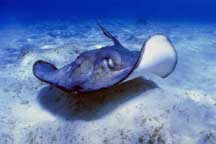| |
 |
 |
PEW, IS THAT THE OCEAN?
The Pew Oceans Commission Reports on Ocean Pollution, Coastal Development, Overfishing, and More
|
|
Just when you thought it was safe to go back in the water... you find out the ocean is full of microscopic invaders from Earth! That's right—much of our prime ocean areas are contaminated with disease-causing micro-organisms from sewage overflows; malfunctioning septic systems or inadequate sewage treatment plants; and boating wastes. Ugh! Those things are about as good for your health as a bubonic daiquiri.
In addition to microbial pollution, coastal ocean waters are plagued by "nutrient pollution," whose ultimate source is primarily the fertilizers applied to farmers' fields and homeowners' lawns. The 2003 final report from the Pew Oceans Commission states that more than 60 percent of our coastal rivers and bays are moderately to severely degraded by nutrient runoff. The problem is so bad in the Gulf of Mexico that there is now a low-oxygen coastal dead zone the size of Massachusetts where the normal marine life is either dead or gone. A similar 100-mile-long dead zone appeared in the Chesapeake Bay in 2003.
The Pew report documented numerous other problems related to the health of oceans:
- Overfishing — The number of fish within many prime species has been significantly reduced by use of high-tech fishing practices that deplete fish stocks, degrade nursery areas, and produce wasteful bycatch.
- Coastal Overdevelopment — Excessive construction in coastal zones greatly impacts the health of coastal wetlands, estuaries, and tidal zones.
- Chemical Pollutants — Nutrients and toxic substances wash into coastal waters from farms, city streets, suburban yards, and polluted air, contaminating habitats for fish, shellfish, marine mammals, and the entire web of ocean life that supports them.
We need to also add into the oceanic mix such problems as oil spills; contamination of fish species with mercury, PCBs, and other toxins; declines of top species like whales and sharks; damage to coral and ocean bottoms; invasive species; and problems caused by the rising fish-farming industry. Many once thought of the
 oceans as an endless source of food and other resources. Those days are gone. The Pew report goes as far as to say that some ocean ecosystems are collapsing.
oceans as an endless source of food and other resources. Those days are gone. The Pew report goes as far as to say that some ocean ecosystems are collapsing.
Part of the problem in correcting the situation, says the report, is disorganization in the US government when it comes to ocean policy. In Congress alone there are over 60 committees and subcommittees that address some form of ocean policy. Add to that the executive branch's offices and agencies, as well as state and regional ocean agencies, and the health of the oceans is caught between Govzilla and Charybdis. The Pew Commission recommends establishing an independent federal ocean agency—along with regional ecosystem councils—to bring order to the bureaucratic mess. They also recommend a greatly increased focus on water quality and ecosystem health.
|
|
In case you're wondering whether things have improved since the Pew report was released in June 2003, the Association of Cute But Smelly Marine Mammals just filed a petition claiming that the government owes them free health care. Anyway, if you want to learn more about our wonderful oceans and the problems that plague them, here are some resources:
|
| |
|
BRAIN FOOD |
|
The US EPA notes that rainwater runoff from lawns, farms, streets, construction sites, and other urban areas picks up animal waste, fertilizer, pesticides, trash, gasoline, oil, and many other pollutants.
|
|
|
|
|
|

To sail on a dream on a crystal clear ocean,
To ride on the crest of the wild raging storm,
To work in the service of life and the living,
In search of the answers to questions unknown,
To be part of the movement and part of the growing,
Part of beginning to understand . . . more
"Calypso"
John Denver
Windsong
Pop/Soft Rock
|
|
 "Aye Calypso, the places you've been to, the things that you've shown us, the stories you tell..." It's hard to stop following along with these wonderful seafaring lyrics—some of the best from John Denver—and a great tribute to Jacques Cousteau, the captain of the Calypso and a true champion of the sea. The good news is that this song is on "Windsong," one of Denver's best studio albums. It also includes the hit songs "I'm Sorry" and "Fly Away," as well as the excellent "Looking For Space," which—for you trivia fans—was featured in a season-finale episode of "Magnum PI." This is perhaps John Denver's finest work.
"Aye Calypso, the places you've been to, the things that you've shown us, the stories you tell..." It's hard to stop following along with these wonderful seafaring lyrics—some of the best from John Denver—and a great tribute to Jacques Cousteau, the captain of the Calypso and a true champion of the sea. The good news is that this song is on "Windsong," one of Denver's best studio albums. It also includes the hit songs "I'm Sorry" and "Fly Away," as well as the excellent "Looking For Space," which—for you trivia fans—was featured in a season-finale episode of "Magnum PI." This is perhaps John Denver's finest work.
|
|
Get more reviews, hear clips, or get purchase info for this album at
Amazon.com
Or see more Songs for a Better Planet
|
|
Back to joke page | More articles, by category
FREE AUDIO CLIPS

|
|
|
|
|
Hey, we don't pick
the Google ads! – GP
|
| |
| CLICKS ON OUR ADS AND PURCHASES VIA OUR AMAZON LINKS HELP SUPPORT THIS FREE SITE... THANKS! |
|
|
"However fragmented the world, however intense the national rivalries, it is an inexorable fact that we become more interdependent every day. I believe that national sovereignties will shrink in the face of universal interdependence. The sea, the great unifier, is man's only hope. Now, as never before, the old phrase has a literal meaning: We are all in the same boat."
— Jacques Cousteau
quoted in "National Geographic" [1981]
|
|


